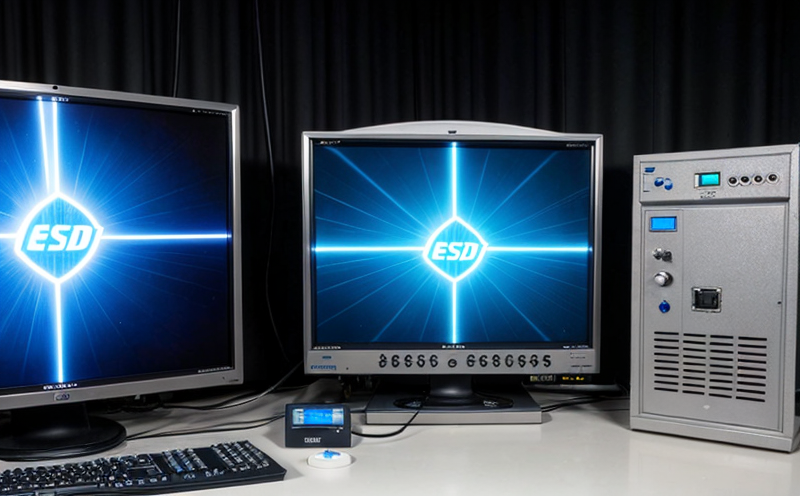MIL-STD-461 Electromagnetic Compatibility Signal Integrity Testing
The MIL-STD-461 is a U.S. Department of Defense standard that addresses electromagnetic compatibility (EMC) for equipment, systems, and components used in military environments. This standard ensures that electronic devices do not generate excessive electromagnetic interference (EMI) or suffer from interference when operating within specified frequency bands.
The EMC testing under MIL-STD-461 is crucial for ensuring reliable performance of electronic devices across various environmental conditions such as noise, temperature variations, and mechanical shock. Signal integrity tests within this standard are particularly important as they ensure the proper transmission and reception of electrical signals in complex systems like semiconductors and microchips.
Signal integrity testing under MIL-STD-461 involves assessing several key parameters that affect how electrical signals travel through a circuit, including:
- Reflection
- Voltage drop along the transmission line
- Jitter and skew in digital signal propagation
- Electrostatic discharge (ESD) robustness
- Intermodulation distortion (IMD)
The testing process typically involves placing test specimens on specialized test boards designed to simulate real-world operating environments. The tests are conducted under controlled conditions, with specific environmental factors like temperature and humidity being adjusted as necessary.
Achieving compliance with MIL-STD-461 requires meticulous attention to detail throughout the entire testing process. From initial design reviews to final production testing, every stage must adhere strictly to the standard's requirements. This ensures that any potential issues are identified early on, allowing for corrective actions before full-scale manufacturing begins.
To meet these stringent standards effectively, it is essential to have access to advanced instrumentation capable of accurately measuring all relevant parameters. Our laboratory uses state-of-the-art equipment that meets or exceeds the precision specifications outlined in MIL-STD-461. This allows us to provide accurate and reliable test results, which are critical for maintaining high levels of quality assurance.
Our team of experienced professionals understands both the theoretical aspects of signal integrity and practical challenges encountered during testing. By combining this knowledge with cutting-edge technology, we can offer comprehensive solutions tailored specifically towards meeting MIL-STD-461 requirements.
Applied Standards
| Standard Name | Description |
|---|---|
| MIL-STD-461E | This version of the standard defines methods for measuring and controlling electromagnetic interference (EMI) in military equipment. It includes requirements related to ESD, RFI, conducted emissions, radiated emissions, immunity to conducted and radiated interference. |
| ISO/IEC 17025 | An internationally recognized standard for the competence of testing laboratories which ensures that we adhere to strict quality management systems. |
The application of these standards guarantees consistency and accuracy in our test results, ensuring that all clients receive reliable data they can trust. Compliance with MIL-STD-461E specifically helps ensure robust performance across various environmental conditions while also protecting against potential interference from other electronic devices.
Benefits
- Ensures compliance with military-grade standards, enhancing product reliability and safety.
- Reduces the risk of costly rework or redesign by identifying issues early in the development process.
- Improves overall product quality through precise measurement techniques supported by advanced instrumentation.
- Promotes trust among stakeholders by providing verifiable test results that meet international standards.
- Facilitates easier integration into larger systems due to consistent performance across all components.
By partnering with our laboratory for MIL-STD-461 ESD, EMC & Signal Integrity Testing services, you gain access to world-class facilities and expertise dedicated solely towards ensuring your products meet the highest standards of quality and reliability. This collaboration not only streamlines your product development cycle but also enhances brand reputation through verified compliance.
Environmental and Sustainability Contributions
The rigorous testing processes mandated by MIL-STD-461 contribute positively to both environmental protection and sustainability efforts in several ways:
- Reduction of waste: By identifying defects early, we minimize the need for rework or replacement of defective units during production.
- Energy efficiency: Ensuring robust signal integrity can lead to more efficient operation of electronic devices, thereby reducing energy consumption over their lifecycle.
- Eco-friendly design: By promoting better manufacturing practices based on MIL-STD-461 requirements, we encourage the use of materials and processes that have minimal impact on the environment.
In addition to these direct benefits, adherence to such stringent standards fosters innovation within the industry. As manufacturers strive to meet ever more demanding specifications, they are compelled to explore new technologies and approaches that could ultimately lead to greener practices across all aspects of electronics manufacturing.





